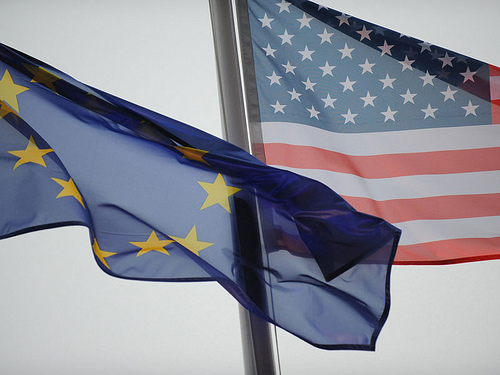
Sunday’s state election in Hamburg saw a comfortable victory for the Social Democrats over Chancellor Merkel’s Christian Democrats, and Europe offers muted reactions to the crisis in Libya.
HEADLINES:
Russia to continue military cooperation with Japan (RIA Novosti)
Russia will not cease military cooperation with Japan or any other countries in the Asia-Pacific Region, a source from the Defense Ministry said on Monday.
Ministers discuss aid to North Africa (European Voice)
European Union foreign ministers meeting in Brussels today (21 February) discussed aid to Egypt and Tunisia, and condemned the violence against demonstrators used by Libya’s government over the past few days.
German Defense Minister Defies Calls to Quit Over Plagiarism (International Herald Tribune)
Defying calls by the opposition for his resignation, the German defense minister, Karl-Theodor zu Guttenberg, said Tuesday that he would hold on to his job despite his admission that he had submitted a faulty dissertation for his doctoral degree.
EU: Libyan crisis complicated by lack of aid network (EUobserver)
As dramatic events continue to unfold in Libya, the EU’s humanitarian aid chief has said the dearth of aid organisations on the ground could pose a key problem if the situation deteriorates further.
Hamburg Election Result Is a ‘Political Tsunami’ (Spiegel Online)
The center-left Social Democrats thrashed Angela Merkel’s Christian Democrats in Sunday’s state election in Hamburg. German commentators ponder the significance of the result for national politics.
David Cameron hails ‘opportunity’ on Egypt visit (BBC News)
David Cameron has met Egypt’s new leaders, as the first world leader to visit the country since President Hosni Mubarak was forced out of office.
German troops admit fears over ‘partnering’ with Afghan soldiers (Deutsche Welle)
The bodies of three German soldiers killed in northern Afghanistan last week by an Afghan colleague have been flown home. The attack has led to fears over the safety of ‘partnering’ German and Afghan soldiers.
Gaddafi’s last stand, Europe dithers (Presseurop)
The bloody repression of the Libyan people by the Gaddafi regime is exacerbating the problem of a Europe faced with revolts in the Arab world, writes the European press, which calls for concrete and coordinated action.
EDITORIALS AND COLUMNS:
Europe’s reforms may come at a high price (Axel Weber, Financial Times)
In the coming weeks, European policymakers will have to decide on an overhaul of governance of the European monetary union. As a guiding principle the European Council has clearly – and, in my view, rightly – stated that the main foundations of EMU and the European Union treaty have to be respected. This means the principles of subsidiarity, responsibility of individual member countries and no-bail-out remain essential for the EU. In this context, what cornerstones are to be considered in the matter of reforming EMU governance?
A deal struck with tyranny (Ian Birrell, Daily Telegraph)
The Libyan people are finally rebelling against their despised ruler and his corrupt regime. But Gaddafi’s strength in the Arab world was shamefully bolstered by his oil pact with Tony Blair, says Ian Birrell.
Compiled with the assistance of Klee Aiken and Elyse Newman.
Image: transatlantic.jpg
